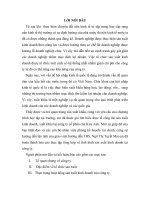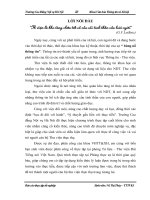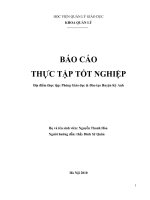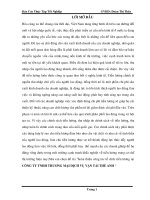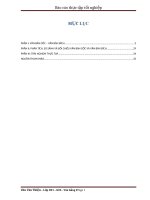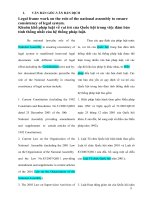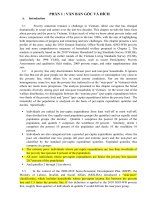Báo cáo thực tập tốt nghiệp tiếng anh (33)
Bạn đang xem bản rút gọn của tài liệu. Xem và tải ngay bản đầy đủ của tài liệu tại đây (312.46 KB, 24 trang )
ACKNOWLEDGEMENT
For complete my research, I have been fortunate to receive invaluable contributions
from many people.
First, I should like to express my deepest gratitude to my supervisor, Ms Van Lam
for her help and excellent suggestions, expert advices and detail critical comments.
Without her help, my work would not have been completed.
Secondly, I greatly thank for Mr. Edward Leffew for his reading of my draft as well
as his suggestions and comments, to all my classmates who give me a hand to ideas and do
the details of my research.
Finally , I am too aware that in spite of all the advices and assistances, I feel that the
project is far from perfect, therefore, my sole responsibility for any inadequacies and
shortcomings that the study may be considered to have.
Vinh, May 25th, 2010
LE CHI HAU
i
ABSTRACT
The importance of English Idioms in communication, language teaching and learning
English has stimulated the author in the study on English Idioms .In this research, the
author discuss about the different definitions of Idioms and their types , meanings. the
Idioms in Harry Potter is dealt with ,too. In addition, the author suggests some ways for
teaching and leaning Idioms.
ii
THE TABLE OF CONTENS
ACKNOWLEDGEMENT.....................................................................................................i
ABSTRACT...........................................................................................................................ii
TABLE OF CONTENTS…………………………………………………………………..iii
PART I
INTRODUCTION
1. Justification of the Study……………………………………………………………1
2. Aims and Objectives of the Study…………………………………………………..1
3. Method of the Study……………………………………………………………….1
4. Scope of the Study…………………………………………………………………..2
5. Format of the Study…………………………………………………………………2
PART II
INVESTIGATION
CHAPTER 1 THEORETICAL BACGROUND
1. English Idioms : Definitions………………………………………………………..3
2. Grammatical Features of English Idioms ………………………………………….3
3. Types of English Idioms …………………………………………………………...4
4. History of Idioms Study……………………………………………………………6
5. Idioms Meaning …………………………………………………………………...7
6. Distinction of Idioms and Proverbs………………………………………………..7
CHAPTER 2 IDIOMS IN THE TENTH FIRST CHAPTERS OF “HARY POTTER AND
THE GOBLET OF FIRE”
1. Introductions……………………………………………………………………… 8
2. Varieties of Idioms types in Harry Potter………………………………………….9
CHAPTER 3: SOME SUGGESTIONS FOR TEACHING AND LEARNING IDOMS IN
SCHOOLS , SUGGESTED EXCERCISES
1. Some suggestions for teaching and learning Idioms in schools……………...........11
1.1 Learning and teaching Idioms through stories…………………………………….11
1.2 Learning and teaching Idioms through advertisements…………………………12
1.3 Learning and teaching Idioms through pictures…………………………………..14
2. Some suggested exercises
2.1 Fill in blanks with suitable words……………………………………………..16
2.2 Multi choice……………………………………………………………………16
2.3 Equivalent meaning box.....................................................................................17
2.4 Find the equivalent Idioms from Vietnamese and English.................................18
2.5 Find the equivalent Idioms From English into Vietnamese .............................18
PART III CONCLUSION
1.
ricapulation................................................................................................
..................19
iii
2. Suggestions for further
study.....................................................................................19
REFERENCES.................................................................................................................20
iv
PART I: INTRODUCTION
1. Justification of the Study
The importance of English in life is confirmed and everyday there are thousands
of people using it as communication language and working language. Studying English
always is the ambitions, assions of people. When having the assignment about doing
research of English on linguistics, the first topic the author wants to do is English
idioms. There are some reasons for choosing the English idioms is topic.
First, Idioms always play an important role in any language, in Vietnamese also
in English. Studying English, we do not use for communicating and working but also
for understandings the thick and diverse cultures of English countries. Therefore, the
more you know Idioms the more you catch from literature and other domains. Idioms
are hard to learn and understand, so the thing is, when you have Idioms on your
hands ,it means that you understand and control your English efficiently.
Secondly, as it is said before the English idioms always cause us difficulties in
communications and understanding. Having an overall look at the idioms will help us
to improve our knowledge and flexibility in using English. That is a key to have a
further understanding and the right way to control your English.
Finally, English idioms are an interesting topic. There are a few people doing
researches about them but focusing on the types in a story is another new aspects.
2. Aims and Objectives of the study
Studying about English idioms the author has some aims to attain:
A first aim of this study is to help the learners to improve, their knowledge’s of
English in general and the idioms in details as well.
The second aim of this study is to give the students and learners the some
detailed information that help them to improve their understanding of English and
using more effectively.
The third aim is that through this study the author give some suggestions for
learning and teaching idioms in schools. In addition, the suggested exercises to
improve the ability to use the English better.
1.3 Methods of the Study
In studying English idioms, the author uses some methods:
1
The first method is using quantitative to count and consider the frequencies of
idioms. This will help the readers know that the depth of idioms and explore the
underground meaning of the stories
The qualitative method is also used to have an overall look of what kind of
idioms used most.
1.4 Scope of the Study
In this study the author just discuss about the idioms in the “Harry Potter and
the Goblet of fire” in the five chapters also the types idioms. In addition, the author’s
interest about the features of the idioms is the distinctions of proverb and idioms.
1.5 Format of the Study
In this study the author deal with the idioms in 5 chapters in “Harry Potter and
the goblet of fire”
The first part is INTRODUCTION. In the introduction, the author gives the
general background that includes justification, the aims and objectives, the scope and
the format of the study. Justification of the study is the reason for choosing the topic
and the interest about the topic the author wants to research. The aims, objectives are
what the author does the research for and what the author want to acquire from the
research. The scope and the format set the border for the researcher and readers about
how large the topic is.
The second part is INVESTIGATION. There are 3 chapters in this part. In the
first chapter the author gives the theoretical background about idioms: the definitions
of idiom, the grammar characteristics, the history of idioms study, the idiom meaning
and the distinctions between idioms and proverbs. The second chapter discuss about the
idioms in the 5 chapters in “Harry Potter and the Goblet of fire”. In chapters 3 the
author has some suggestions for learning and teaching idioms in school: teaching and
learning English idioms through: stories, advertisement and pictures. After that, there
are some suggested exercises to apply to teach and learn English idioms: fill in blank,
multi- choice, and equivalent meaning box, translations from English to Vietnamese
and translation from Vietnamese into English.
The part 3 is the CONCLUSION. In this part the author gives the concluded
comment, present what acquire for each chapter, and suggest for further research.
2
Part II
INVESTIGATION
Chapter 1 : theoretical background
1.1: The definition of IDIOMS
There are many definitions about idioms and all are right in some ways.
As Jonathan Crotchet (1905) defines idiom is a phrase whose meaning is difficult or
sometime impossible to guess by looking at the individual word it contains (from advanced
learner’ dictionary)
Jennifer Sidles and W.MC
Mordi (1988) define an idiom as a number of words which
,when taken together have together ,have different meaning from the meaning of individual
meaning of each word.
Idioms are not constructed from each of constituent. If we have a sentence like that:
Have a bee in one’s bonnet
. It can be separated every word and the final thing is the meaning of that some one really
has a bee in his bonnet of the car. However, it is not right for using in real life. It has the
figurative meaning: have a fixed idea that stays in one's mind.
1.2 Grammar characteristics of English idioms
1.2.1: An idiom is a multiword expression. Individual components of an idiom can often
be inflected in the same way individual words in a phrase can be inflected. This inflection
usually follows the same pattern of inflection as the idiom’s literal counterpart.
1.2.2: An idiom behaves as a single semantic unit.
It tends to have some measure of internal cohesion such that a literal counterpart that is
made up of a single word can often replace it
1.2.2.1 It resists interruption by other words whether they are semantically compatible or
not
1.2.2.2 It resists reordering of its component parts.
1.2.3
An idiom has non-_productive syntactic structure. Only single particular lexemes
can collocate in an idiomatic construction. Substituting other word from the same generic
lexical relation set will destroy the idiomatic meaning of expression
3
1.3: The types of Idioms
Idioms can be treated as a type of collocation involving two or more words in context. We
can divide the idioms as full idioms and partial idioms
The full idioms, which cannot be, predicted from the individual meanings of the
morphemes they comprise. For example, when someone says, “kicked the bucket” we do
not imply that they necessarily hit the certain type of container for liquids with their foot,
what we mean that they “died”
The partial idioms are some of words have their usual meaning while the others have
meanings that peculiar to that particular structure. Thus in “red hair” the word “hair” it has
usual meaning because it does refer to the fine filaments growing from the human head,
but “red” is idiomatic in the sense it does not refer to the strict color term.
Another way of divided idioms: There are many types of idioms. These types are divided
of which kinds of things are related.
The idioms are divided in terms of the types of what they are concerned about:
Animal idioms
Arm ,hand and finger idioms
Bird idioms
Body idioms
Business idioms
Business Negotiation Idioms
Card playing idioms
Clothes idioms
Medical idioms
Money idioms
Mouths and teeth Idioms
Color Idioms
Court and judge idioms
Ear ,Eye and Nose idioms
Education and School idioms
Fish ,Insects and Reptile idioms
Food idioms
Head and Mind idioms
Heart idioms
Initials
Leg and Foot idioms
Legal and law idioms
Number idioms
Sport idioms
Relationship idioms
Love idioms
Ex :
-.Find Mr. Right :find the right or perfect person (tìm đúng người)
-Cost a pretty penny: to cost a lot of money ( tốn rất nhiều tiền)
-Follow one's heart: to act according to one's feelings (hành động theo cảm xúc )
-To Breathe one’s last: die ( trút hơi thở cuối cùng , qua đời )
-Out of the red: out of debt ( thoát khỏi nợ nần)
4
-At first: initially, at the beginning( ban đầu)
Idioms following the Alphabet:
A idioms
N idioms
B idioms
O idioms
C idioms
P idioms
D Idioms
Q idioms
E idioms
R idioms
F idioms
S idioms
G idioms
T idioms
H idioms
U idioms
I idioms
V idioms
J idioms
W idioms
K idioms
X idioms
L idioms
Y idioms
M idioms
Z idioms
Ex:
-To be absent- minded: to be forgetful ( sao lãng , hay quên )
-Be hind closed doors: in secret( bí mật )
-Neck of the woods: an area or part of the country( 1 vùng hoặc 1 phần của 1 đất nước)
- Jammed- packed: crowed, full ( đông đúc )
-Very last: the end of something ( kết cuộc của thứ gì đó)
- To say uncle: to surrender, to give in ( đầu hàng)
5
There are more and more idioms of other kinds but it is limited in length of the study I can
not give more examples.
1.4 History of Idiom study :in Europe and USA
In England ,over of Europe and in USA there are many of linguists started their studying
in English Idioms since the very beginning of 20th century .Many Western and American
authors gave great contributions to the collection of English Idioms such as:
-W.Mc Mordie with “ English Idioms and how to use them” (1909) ,which is considered
as the first to research carefully on field of English Idioms.
-Browcal M.Nith :Idioms for everyday use (1994)
-V.H Colin with: A book of English Idioms with Explanations (1958) and American
English Idioms (1986)
-Teachers and researchers from Cambridge University with International Dictionary of
Idioms
1.5 The Meaning of Idioms
There are many different ideas about the Meaning of Idioms .However the basis of
studying ,analyzing many linguistic ideas we come to a conclusion that the meaning of the
meanings of Idioms has 3 common points:
-
the meaning of Idioms is a perfect whole not the sum of meaning of the separated
components
The meaning of Idioms expresses and reflex of idioms expressions and reflects objects
and concepts.
The meaning of Idioms is expressive, figurative.
1.6 A distinction of Idioms and Proverbs
We have to make clear the differences between the idioms and proverbs. There are
some linguistic authors say that the border between them is very small. In some cases,
idioms and proverbs have the same meaning. According to Advanced learner
Dictionary: a Proverb is a short well-known sentence or a phrase that states a general
truth about life or give advices.
•
For example.Barking, dogs seldom bite.
o Meaning: People who are busy complaining rarely take more concrete
hostile action
•
Better safe than sorry.
6
o
Meaning: It is better to take precautions when it's possible that something
can go amiss than to regret doing nothing later if something should indeed
go wrong.
They are sometimes alike so which ways for us to find out the differences? There are
some criteria to distinguish them through characteristics:
They are different in meaning. Idioms are not instructive and moral in nature as
proverbs. Idioms are constructions peculiar to a language. In contrast, Proverb is a lesson
an advice.
They are also not similar in structure or the stability of structure. The constituents of
idioms are unchangeable. If we change or replace them by other words or the order that
will make the different meaning or forming no meaning idioms.
Chapter 2: IDIOMS IN THE HARRY POTTER AND THE GOBLET OF FIRE
1.1 INTRODUCTION
Harry Potter is an artificial novel about a boy called Harry Potter by J.K Rowling ,a
very new writer but she is quickly famous. She is one of the best no0velists in this world
all the time. In 1997, the first book created strange waves all over the world. This novel
makes the children also the adults crazy. They queued up in long
Street to buy the new versions. It is really a hit of the novel world.
The idioms in Harry potter are many and from these idioms, we know more about how
to use an idiom in context. That is the aims of the study.
-
1.2 Idioms in 5 chapters in the “ Harry Potter and the Goblet of fire”
a. In the chapter 1.
As cold as ice( p 2)
-
A cloud of suspicion( p 2)
-
To go one step in further in their attempts (p5)
-
To ease the stiffness in his kneel ( p5)
-
As fast as his bad leg would follow (p6)
-
His nostrils full of the smell of decay(p6)
-
Cold as a sudden blast of icy wind( p7)
-
On duty ,on the watch for signs( p8)
-
There was a note of menace in the cold voice(8)
-
One that many of my followers would give their right hands to perform( p 11)
-
His mouth had gone very dry (p 12)
-
An entirely worthless laugh ,as cold as speech ( p 12)
-
In danger( p 12)
-
Found himself paralyzed with fright(p 12)
7
-
There were sweats on Frank’ forehead now( p 13)
-
In the other hand (14)
-
The snake lifted its ugly triangular and hissed slightly as the legs of the chairs snagged
on its rug (p 15)
-
There was a flash of the green light ,a rush sound
-
Harry wake with a start.
b. In chapter 2:
-
Harry lay flat in his back , breathing as though he had been running.(p16)
-
His bright green eyes puzzled under his untidy black hair.(17)
-
Harry felt as though an ice cube had slipped down his stomach at the very thought.
( p17)
-
He had felt a spasm of honor ( p 17)
-
In the mean time (p8)
-
Ron’s 16 year old twin brother might think Harry was losing his nerves(p22)
-
They put him in mind of palm trees and white sand ( 24)
-
They told him they’d have to cut his pocket money (25)
-
put his mind of things (25)
-
there was no point putting in dreams(25)
In chapter 3 :
-
Her lips pursed over her horse like teeth.( p26)
-
To find excuses for bad mask as usual( p 26)
-
Dudley was big-boned, and that his poundage was really puppy fat ( p 27)
-
He is a boisterous little boy but he would not hurt a fly ( p 27)
-
It is a “ rabbit food” ( p 27)
-
The moment he had got wind the fact that he was expected to survive (28)
-
As quick as a flash( 29)
-
Harry as though he were about to pronounce him under arrest (p 29)
-
As quickly as possible (p30)
-
Harry decided to break the silence.(p30)
-
Harry felt a second stab of annoyance(31)
-
Shaking with anger he shot a nervous look through the window .(32)
-
Making it look badly, mixed black currant ice cream (33)
-
Like a loose firework(38)
8
-
You want to the pants bored off you(37)
-
He sat there on the floor eating it, savoring the happiness that was flooding through
him (37)
In the chapter 4 and 5
- Harry felt a slight sense of foreboding (38)
- As though there had been a warning about an escaped rhinoceros (p41)
- His eyes on his watch and his heart pumping fast from excitement and nerves.( p 42)
-
He waddled as fast as he could into the kitchen ( p 42)
- But they were left in doubt barely a second longer (42)
- What did they want to block up the fireplace for? ( p 43)
- He tried to find words to break the very nasty silence ( 45)
- And the Dudley’s living room whipped out of sight in a rush of endeared- green flames
(p 50)
- Harry shook and feeling calluses and blisters under his fingers (p 52)
- Rule – breaking (52)
- he did it on purpose
There are more idioms that the writer used to express feeling and made the novel
figurative and absorbing to the students’ mind. There are 63 idioms that studied and they
are the illustration of the varieties of idioms in novel. That will help the students know
more and more about the various types of idioms.
The kind of idioms that are used most is “as ... as”. There are 9 idioms of this kind: as …
as is a contrastive and comparative idioms: as cold as ice or as quick as his bad leg could
follow…
The next type is : break the silence is said in some different way: break the silence and
break the nasty silence.
In 5 chapters the writer used idioms to promoter the deep meaning of the novel to make it
more meaningful and fascinated.
9
Chapter 3: : Some suggestions for learning and teaching English Idioms
and suggested Exercises
3.1 Some suggestions for learning and teaching English Idioms
3.1.1 Teaching Idioms using stories
As you know that teachers and students really like to read stories, especial funny stories.
the question here is “why do not the teachers use stories to teach Idioms?”. There fore,
when using stories will create the new wind way, the difference compared with the
traditional methods.
To apply this into teaching teachers should find the suitable stories according to the
age , sex ,psychology ,interest. To the students at schools teacher should find the funny
and meaningful stories. It will help the students enjoy them and after that figuring out some
thing to think over. The most important thing is finding a short story because of the
limitation of time and avoiding boredom.
It is better to make copies for all students to make clear
The next task is after a story the teacher should give at least 3 idioms for students think
and then give them the small clues about them so that the students know the way of using it
in contexts and try their best to guess the meaning of the idioms.
In addition, finding the stories that student finding morale and develop their personalities
is also very important
The last task is if students do not understand or having difficulties , the teacher give
explanation and help them control the idioms that given.
Example:
Try your best to deal with these idioms and guess their meanings.
10
1.Ants in your pants:
2.I am so hungry ,I could eat a cow
a.
very hungry
b. Too slow
3. All ears
c. Eager and attentive to hear something
4. As slow as snail
d. Very fast
5.As fast as a cheetah
e. Hurry, can not keep still
Heroes
by Noah M.
Once there was a boy, but he was not just any boy. This boy was about to become a hero.
“Wake up Ryan” said Josh “it is morning. “What” said Ryan “Wow, you were sleeping like
you had ants in your pants”, said Josh. What ever let’s go down to the Pancake House for
some food. Good Idea I’m so hungry I could eat a cow.
When they got to the Pancake House they were starved. After they were seated. Ryan asked
Josh if he could tell what he had dreamed about the following night. “I’m all ears” said Josh.
After they had there food. Ryan had finished telling his story. When they were eating a man
walked into the restaurant. “ Josh look doesn’t that man look just like the one in my dream?”
said Ryan. “ Yes” said Josh. Look he is leaving. Let’s follow him. Good Idea. Hurry he is
already out the door, you’re as slow as a snail. said Ryan
11
They finally caught up to him. “Look he is going down the ally.” said Josh. “Look there” It
is another guy with him” said Ryan. “Should we go call the cops?” asked Josh. “No” said
Ryan. Well then what are we going to do? I will think of something. said Ryan. Well It better
be as fast as a cheetah. Said Josh. Why? said Ryan. Because they are coming straight for us!
said Josh, look out. . .
“Where are we?” said Josh. “I don’t know,” said Ryan. “So you to are finally awake.” said
man in black cape. You guys were following me all the way down the ally. So all I ask is,
why? said the man in black. We were following you because... we thought we knew you
josh finished. Well now you know were our secret hide out is, we can’t let you go. said the
man in black. Wait you said “our” who else is there? There is my helper. Tell us the truth...
who are you. I am the number one out law, Justin Alexander. “So for now we will just put
you in the closet,” said Justin.
“Let us out,” screamed Ryan. I be back in twelve hours, if you are good we will give you
some food. Said Justin. “Were going to die in here aren’t we.” said Josh. “No” said Ryan.
“We will find a way out.” “I don’t think we are going to find a way” Josh could not finish his
sentence. “Found it” said Ryan. “They left the door unlocked” “Wow that was easy” said
Josh. Hurry let us go call the cops.
When they finally got to the police center, they told them everything. The police got into
the cars and sped of with Josh and Ryan in the back seat.
When Justin got back, he was shocked. “What are you guys doing here said Justin I mean
you did you get here.” “By the help of these two boys.” said the cop. “You are the worst bad
guy ever, you left the door unlocked.” said Josh. Just after Josh said that Justin’s partner
came run in. “Justin why are there cop cars out front, oh that why.” said Justin’s
partner Mich.
After they were all back at the police station and Justin and Mitch were in their cell the
two boys were interviewed. After that was over the boys were sent home.
The next morning Ryan got a phone call from Josh. “Ryan get out of bed and look at the
news paper.” Ryan gets out of bed and gets the news paper.” His eyes popped out of his
head. “Wow this is amazing were in the paper.” I know you and I were called city heroes.
Well I would call that a day well done.
Suggested answers:1 e 2 a 3 c 4 a 5 d
Teachers give students some questions and after that let them feel the meaning of the story.
The most important task is practice with the idioms given.
3.1.3 Teaching and learning idioms through Advertisements
Likewise, the technique for pictures the tasks of teachers are finding the advertisement
suitable to fascinate the curiosity of the etcher and help students find the idiom by
themselves.
12
Ex :
Two Ads here are the examples of the popular of using Idioms in Advertisements. The
students will find it easier to absorb into their minds. The most important thing is make
copies for students because of saving time and convenience.
3.1.4 Teaching and learning idioms through pictures
The teachers should hand out some tips of paper that includes pictures of idioms. Giving
them the most interesting and funniest pictures the teacher can that will create the
strangeness in studying, especially in speaking class,. Then the teachers give assignment
for students to look at and find out the idioms in the pictures and try their best to get the
meanings. After that having discussions.
The final task for the teachers are to explain more clearly to students.
Ex:
13
There are pictures that are more interesting for students laughing and they will understand
in interest.
14
3.2 Some suggested exercises
3.2.1: Fill in the blank to study English Idioms
Fill in the blank to complete sentences of Idioms:
1. You were sleeping as though you had... in your pants.
2. H is a super runner. He can run as ......... as a cheetah.
3.He does every thing very slowly. He is as slowly as a .........
4. No ......., no gains.
15
5. Jack had a fight with 2 boys and after a few minutes he had a..... eyes.
6. The girl had........ heart when her boyfriend left her for good.
The suggested answer: 1 pants 2 fast 3 snail 4 pains 5 black 6 heavy
3.2.2 Multi choice
Choose an idiom to replace the expression in the brackets:
1: He is the (most important person) in his company.
A: Holy cow
C: Dong in the manger
B: Alley cat
D: Top dog
2. The girl never eats and is (very skinny)
A: Skin – deep
C: Broad in the beam
B: skin and bones
D: A bundles of nerves
3. I do not want to have his resignation from the company (as my responsibility)
A: Of f my chest
C: Over my dead body
B: In my blood
D: On my shoulders
4. The little boy was sitting in the office with (nervous excitement)
A: Ants in his pants
C: AS snail’ space
B: The world as his oyster
D: A cold fish
5. The man is (an unfriendly person) and never talks to others
A: A fish out of water
B: A cold fish
C: A kettle of fish
D: a small fry
6. The girl had a ( feelings of unhappiness) when her boy friend left her
A: Big heart
B: Heart of gold
C: Change of heart
D: Heavy heart
7. She was (very much in love with) the junior accountant in her office.
A: Interested in
C: Double dating
B: Head over heels in love with
D: Steal the heart of
8. The couple always appeared to be (an ideal couple).
A: The perfect couple
C: The one and only
B: Good together
D: Making sees at each other’s
9. I spent most of the morning (reading a book).
A: On campus
C: Goofing off
C: Counting noses
D: With my nose in a book
10. We closed the store early in order to (count the number of items we had)
A: Take stock
C: Run shot
B: Work over
D: Gain ground
Suggested answers:
1 D 2 B 3 D 4 5 B 6 D 7 B 8 A 9 D 10 A
16
3.2.3 Equivalent meaning Box
Draw arrow to the best answer foe each idiom in the box below:
1: Follow one’s heart
2: Black eye
3: Half – baked
a. to be thought about or studied carefully
b. to buy something cheaply
c. to get married
4: Buy something for a song
d. to act according to one’s feelings
5: Hard – nosed
e. someone who you think is stupid
6:Birb brain
f. a bruise near one’s eye
7:Say “ I do”
g. to be not weak or soft ,to be stubborn
8: Dressed to kill
h.By foot
9: By shank’s mare
i: to wear one’s finest clothes
10: Carry the ball
k: to be in charge of
Suggested answer: 1 d 2 f 3 a 4 b 5 g 6 e 7 c 8 i 9 h 10 k
3.2.4 Finding the equivalent idioms from English into Vietnamese
a. Make or Mar.
..............................................................................
b. Men make houses, women make homes.
..............................................................................
c. Diamonds cut diamonds.
..............................................................................
d. Never put off until tomorrow what can do today.
..............................................................................
e.. No pains , no gains
...............................................................................
f. No pain, no cure
...............................................................................
g. Like father , like son
................................................................................
Suggested answers:
a :Được ăn cả ngã về không
b. Đàn ông làm nhà , đàn bà xây tổ ấm.
c. Vỏ quýt dày có ngón tay nhọn.
d.Việc hơm nay chớ để ngày mai .
e Gian nan mới có thành cơng.
f. Thuốc đắng giã tật.
17
g. Cha nào con nấy.
3.2.5: Finding the equivalent idioms from Vietnamese into English
a. Không thầy đố mày làm nên.
...............................................................................
b. Ác giả, Ác báo.
................................................................................
c. Ai làm nấy chịu.
................................................................................
d. Tốt gỗ hơn tốt nước sơn.
.................................................................................
e Xa mặt cách lòng
....................................................................................
f. Thuốc đắng dã tật.
................................................................................
Suggested answer:
a: No guide, no realization.
b: As the call so the echo .
c: He who breaks , pays.
d: Beauty is only skin deep.
e: Out of side out of mind .
f : No pain no cure.
18
PART III: CONCLUSION
The author did the survey of the understanding about the idioms in English. The domain of
idioms in our life is very large and they have a big influence in learning, teaching and
acquiring language. The important of idioms was improved because everywhere you can
see that idioms will exist in not only printed editions but the everyday using language as
well.
In part1, the author gives the introduction about the study: the reason, the aims, objectives,
scope, format and the method of the study. The part 2 investigation: in the chapter 1, the
author discusses the theoretical background of idioms: the definition, the characteristics,
the history of the studying idioms, the distinction between idioms and proverbs. In the
chapter 2 the author presents the varieties of the in the first 5 chapters in the “Harry Potter
and the Goblet of fire” .the next chapter 3: the author also suggested some kinds of
exercises for students and teachers read and acknowledge. The key of control idioms in
your hand is practicing in connection with the right methods and kinds of exercises that
teachers give out.
The research just gives very small topic about idioms. Idioms are interesting topic, can
other researchers do other researches about the idioms in other books, stories or deeply
research about the ways of using right methods to teach and learn English idioms in
schools
19
REFERENCE
-Advanced learner’ dictionary of Oxford university
- Http/www: Idiom connection.com
- “Harry Potter and the Goblet of fire” J.k Rowling (published in 2000)
- “Word, meaning and vocabulary” by Howard Jackson and Etienne Ze Anvela
20

